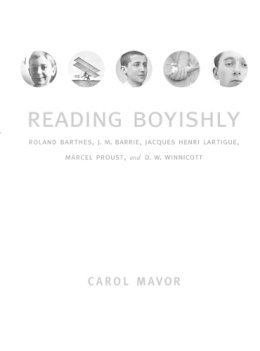
Reading Boyishly: Roland Barthes, J. M. Barrie, Jacques Henri Lartigue, Marcel Proust, and D. W. Winnicott
Carol Mavor
To “read boyishly” is to covet the mother’s body as a home both lost and never lost, to desire her as only a son can, as only a body that longs for, but will never become Mother, can. Nostalgia (from the Greek nostos = return to native land, and algos = suffering or grief) is at the heart of the labor of boyish reading, which suffers in its love affair with the mother. The writers and the photographer that Mavor lovingly considers are boyish readers par excellence: Barrie, creator of Peter Pan, the boy who refused to grow up; Barthes, the “professor of desire” who lived with or near his mother until her death; Proust, the modernist master of nostalgia; Winnicott, therapist to “good enough” mothers; and Lartigue, the child photographer whose images invoke ghostlike memories of a past that is at once comforting and painful.
Drawing attention to the interplay between writing and vision, Reading Boyishly is stuffed full with more than 200 images. At once delicate and powerful, the book is a meditation on the threads that unite mothers and sons and on the writers and artists who create from those threads art that captures an irretrievable past.
Product Details
About Carol Mavor
Reviews for Reading Boyishly: Roland Barthes, J. M. Barrie, Jacques Henri Lartigue, Marcel Proust, and D. W. Winnicott
Library Journal
“One of the best-looking books of the year, an extended homage to the discreet typography of Barthes’ Camera Lucida (1980) and Roland Barthes par Roland Barthes (1975).”
Brian Dillon
Frieze
“All at once philosophical, historical, biographical, psychoanalytical, scholarly and ‘novelesque’, this is an absolute monster romp through the incredibly intricate tapestry of Oedipal desire, maternal attachment, and nostalgia. . . . This book is a pleasure to hold and savour. Headings and quotes float vertically down the page at the beginning of each chapter making for both tasteful design and intrigue. An asset to any library—though to what section it belongs could prove to be quite a conundrum—this informative, poignant, hedonistic and reflective book is one to devour.”
Kathryn Adams
Leonardo Reviews
“I love Mavor’s book. I love even the way it looks and feels: a thick white block of fine paper, the text enhanced by different fonts, touches of sky-blue ink, and more than two hundred photographs. . . . [Reading Boyishly is] a feast of words and images intricately linked to each other like a cat’s cradle, constantly surprising, amusing, enlightening, and filling both eye and mind.”
Lucy Rollin
Children's Literature Association Quarterly
“My book of the year is Reading Boyishly by Carol Mavor. I have never read a book like it. It's a musing, poetic work, a meditation on the boyhoods of Roland Barthes, JM Barrie, Jacques Henri Lartigue, Marcel Proust and DW Winnicott. It sounds heavy and dry but my mind was set free to dance and flit by this thrilling mix of philosophy, photography, biography and much more. It touched something very deep in me about what it is to be a creative man.”
Grayson Perry
The Guardian
“Nostalgia is intertwined with scholarship in this text as Mavor’s work is a (re)search for this emotion in literature, art, and especially photography. With hedonistic pleasure, she offers exegetical indulgences and connections she has made in a lifetime of poring over texts, films, photographs, and other aspects of literary and visual culture. . . . Mavor effortlessly and purposefully crosses disciplines in Reading Boyishly. . . .”
William V. Ganis
Afterimage
“This is an enchanting homage to ‘four boyish men [writers J.M. Barrie and Marcel Proust, literary critic Roland Barthes, child analyst D.W. Winnicott] and one boy [photographer Jacques Henri Lartigue].’ It's also an embrace of what some have fretted about as an over-attachment to mothers.”
Rebecca Wigod
Vancouver Sun
"It is a sigh of relief, this book, a defense of things that make us feel guilty: nostalgia, apron strings, the ‘good-enough mother,’ the lost mother, the nest, the childhood home, the beauty of boys at play. . . . Food and kissing, eating and not eating, boredom and tenderness—Mavor's is a style to be savored."
Susan Salter Reynolds
Los Angeles Times
"Sprightly, witty, distinctly unlabored, at times willfully unacademic. . . . Boys are potent now in Western cultures—arguably more so than ever. And, if Mavor has complicated our understanding of their appeal rather than clarified it, the effort is nevertheless to much interesting effect."
Richard Canning
Gay & Lesbian Review
